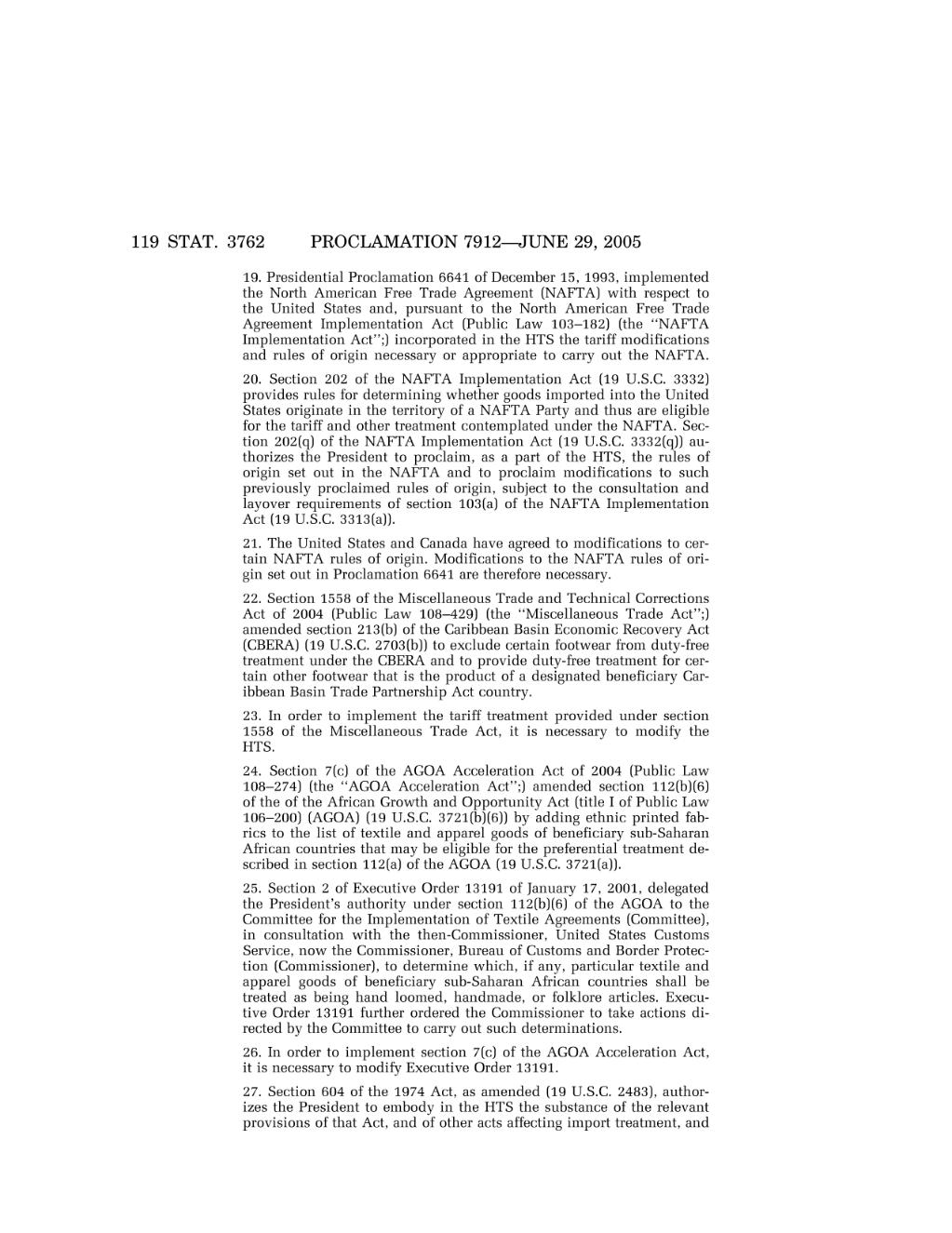119 STAT. 3762
PROCLAMATION 7912—JUNE 29, 2005
19. Presidential Proclamation 6641 of December 15, 1993, implemented the North American Free Trade Agreement (NAFTA) with respect to the United States and, pursuant to the North American Free Trade Agreement Implementation Act (Public Law 103–182) (the ‘‘NAFTA Implementation Act’’;) incorporated in the HTS the tariff modifications and rules of origin necessary or appropriate to carry out the NAFTA. 20. Section 202 of the NAFTA Implementation Act (19 U.S.C. 3332) provides rules for determining whether goods imported into the United States originate in the territory of a NAFTA Party and thus are eligible for the tariff and other treatment contemplated under the NAFTA. Section 202(q) of the NAFTA Implementation Act (19 U.S.C. 3332(q)) authorizes the President to proclaim, as a part of the HTS, the rules of origin set out in the NAFTA and to proclaim modifications to such previously proclaimed rules of origin, subject to the consultation and layover requirements of section 103(a) of the NAFTA Implementation Act (19 U.S.C. 3313(a)). 21. The United States and Canada have agreed to modifications to certain NAFTA rules of origin. Modifications to the NAFTA rules of origin set out in Proclamation 6641 are therefore necessary. 22. Section 1558 of the Miscellaneous Trade and Technical Corrections Act of 2004 (Public Law 108–429) (the ‘‘Miscellaneous Trade Act’’;) amended section 213(b) of the Caribbean Basin Economic Recovery Act (CBERA) (19 U.S.C. 2703(b)) to exclude certain footwear from duty-free treatment under the CBERA and to provide duty-free treatment for certain other footwear that is the product of a designated beneficiary Caribbean Basin Trade Partnership Act country. 23. In order to implement the tariff treatment provided under section 1558 of the Miscellaneous Trade Act, it is necessary to modify the HTS. 24. Section 7(c) of the AGOA Acceleration Act of 2004 (Public Law 108–274) (the ‘‘AGOA Acceleration Act’’;) amended section 112(b)(6) of the of the African Growth and Opportunity Act (title I of Public Law 106–200) (AGOA) (19 U.S.C. 3721(b)(6)) by adding ethnic printed fabrics to the list of textile and apparel goods of beneficiary sub-Saharan African countries that may be eligible for the preferential treatment described in section 112(a) of the AGOA (19 U.S.C. 3721(a)). 25. Section 2 of Executive Order 13191 of January 17, 2001, delegated the President’s authority under section 112(b)(6) of the AGOA to the Committee for the Implementation of Textile Agreements (Committee), in consultation with the then-Commissioner, United States Customs Service, now the Commissioner, Bureau of Customs and Border Protection (Commissioner), to determine which, if any, particular textile and apparel goods of beneficiary sub-Saharan African countries shall be treated as being hand loomed, handmade, or folklore articles. Executive Order 13191 further ordered the Commissioner to take actions directed by the Committee to carry out such determinations. 26. In order to implement section 7(c) of the AGOA Acceleration Act, it is necessary to modify Executive Order 13191. 27. Section 604 of the 1974 Act, as amended (19 U.S.C. 2483), authorizes the President to embody in the HTS the substance of the relevant provisions of that Act, and of other acts affecting import treatment, and
VerDate 11-MAY-2000
09:05 Oct 25, 2006
Jkt 039194
PO 00000
Frm 00080
Fmt 8087
Sfmt 8087
C:\STATUTES\2005\39194PT3.003
APPS10
PsN: 39194PT3
�
